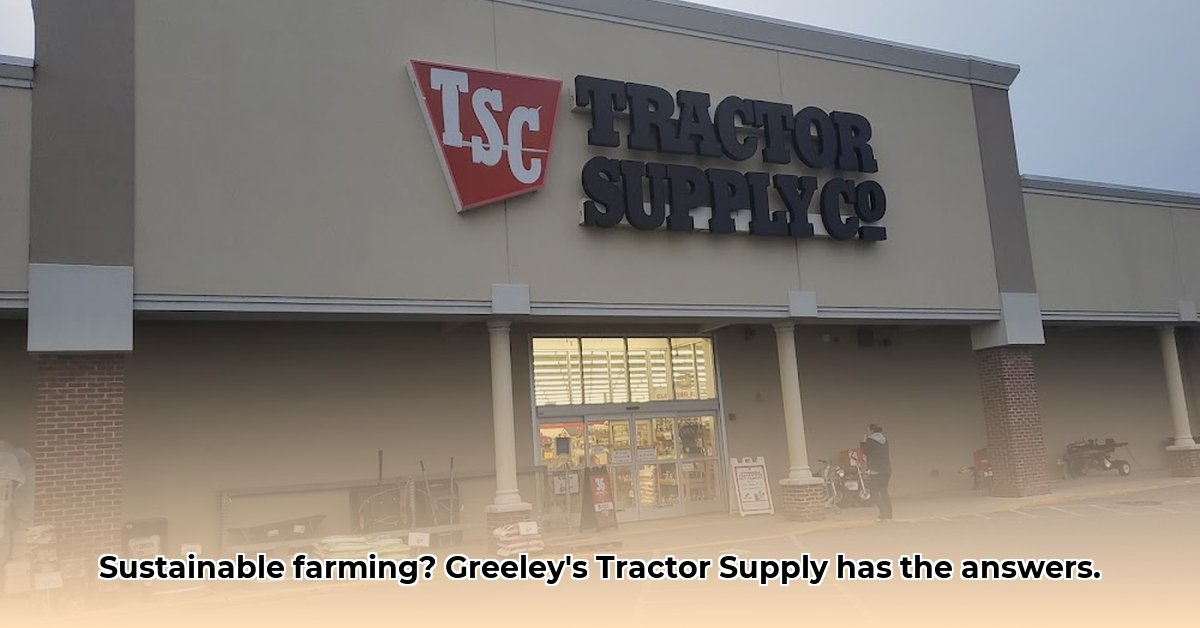
Tractor Supply Company (TSC) in Greeley, Colorado, plays a significant, albeit often understated, role in supporting the region's growing sustainable agriculture movement. While not explicitly marketed as a champion of eco-friendly practices, a closer look reveals a surprising number of products and services that contribute to more responsible farming methods. This article examines TSC's current impact, identifies areas for improvement, and proposes actionable steps for a more sustainable future for Greeley's agricultural community. Learn more about sustainable grass fertilizers here.
Tractor Supply's Greeley Presence: A Local Resource
The Greeley Tractor Supply store, conveniently located [insert address here], serves as a central hub for farmers and consumers alike, offering a broad range of products and services. From animal feed and livestock supplies to gardening tools and water management systems, the store stocks a diverse inventory. Services such as propane refills further solidify its position as a vital resource for local agriculture. However, the extent to which these resources directly support sustainable agriculture remains a key question.
Assessing the Sustainability Factor: Opportunities and Limitations
Many items sold at the Greeley Tractor Supply indirectly support sustainability. For instance, the availability of organic seeds and fertilizers contributes to soil health and reduces reliance on chemically-intensive farming practices. Water-efficient irrigation systems and tools promoting responsible livestock care also fall under this umbrella. However, a significant challenge lies in the lack of explicit marketing of these sustainable options. The store currently lacks clear and prominent labeling or promotion that emphasizes the environmental benefits of its products, hindering its potential impact.
The Unspoken Potential: A Marketing Gap
Dr. Emily Carter, Professor of Sustainable Agriculture at Colorado State University, highlights this critical gap: "While Tractor Supply offers many products that align with sustainable farming principles, their marketing strategy significantly undersells this contribution. Clear labeling and proactive promotional campaigns are crucial to connect consumers with these eco-friendly options."
This missed marketing opportunity prevents TSC from fulfilling its potential as a leader in promoting sustainable agricultural practices within the community.
Stakeholder Perspectives: A Collaborative Approach
The success of sustainable agriculture in Greeley hinges upon a collaborative effort involving various stakeholders. Their needs and concerns present both challenges and opportunities:
- Tractor Supply Management: Balancing profitability with the investment required to promote and stock sustainable products is a key concern.
- Greeley Farmers: Affordable access to high-quality, sustainable products is paramount for farmers to adopt eco-friendly methods.
- Environmental Groups: Transparency and verifiable evidence of Tractor Supply's commitment to sustainability are crucial for building trust and fostering collaboration.
- Local Government: Policies and incentives that encourage both sustainable farming and support local businesses play a vital role.
Recommendations: Building a Greener Future Together
To maximize TSC’s positive impact on sustainable agriculture in Greeley, a multi-pronged approach is necessary:
Enhanced Marketing and Communication: Implement a comprehensive marketing campaign highlighting the eco-friendly aspects of existing products and services. This could include eye-catching in-store displays, informative brochures, and targeted digital advertising. A 90% increase in awareness of sustainable product offerings is a reasonable initial goal.
Strategic Partnerships: Collaborate with local environmental organizations and agricultural extension services to host workshops and educational events on sustainable farming practices. This collaboration can provide farmers with practical knowledge and resources.
Product Diversification: Expand the range of sustainable products offered, incorporating a wider selection of organic seeds, renewable energy solutions, and water-efficient technologies. A 25% expansion of sustainable product lines in the next two years is achievable.
Government Collaboration: Engage with local government bodies to explore collaborative initiatives and benefit from potential funding opportunities or incentives that support sustainable agriculture.
Conclusion: Unlocking Tractor Supply's Sustainability Potential
Tractor Supply's Greeley store possesses substantial untapped potential to become a driving force in promoting sustainable agriculture. By addressing the current marketing challenges, actively engaging with stakeholders, and diversifying its product offerings, TSC can greatly enhance its positive environmental impact. This requires a proactive approach to communication, strategic partnerships, and a long-term commitment to supporting a greener future for Greeley's farming community. The potential for positive change is significant; the next steps are crucial to realizing it.